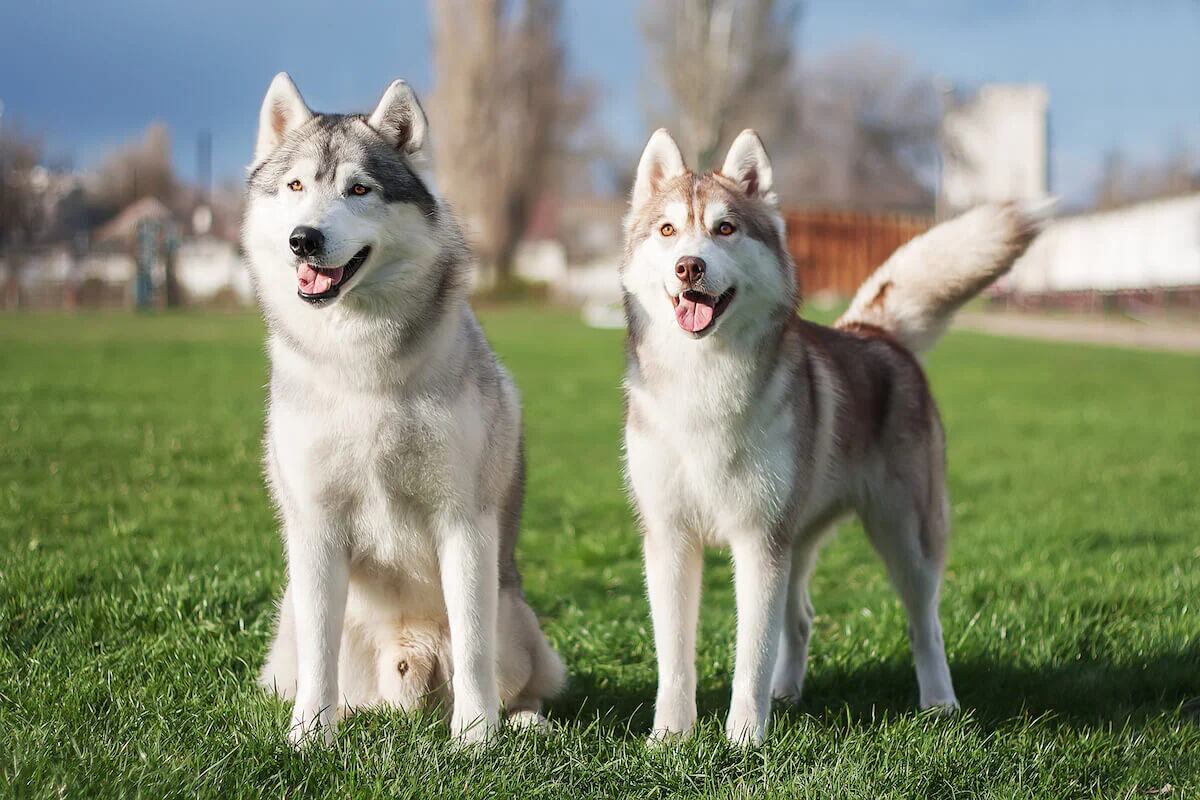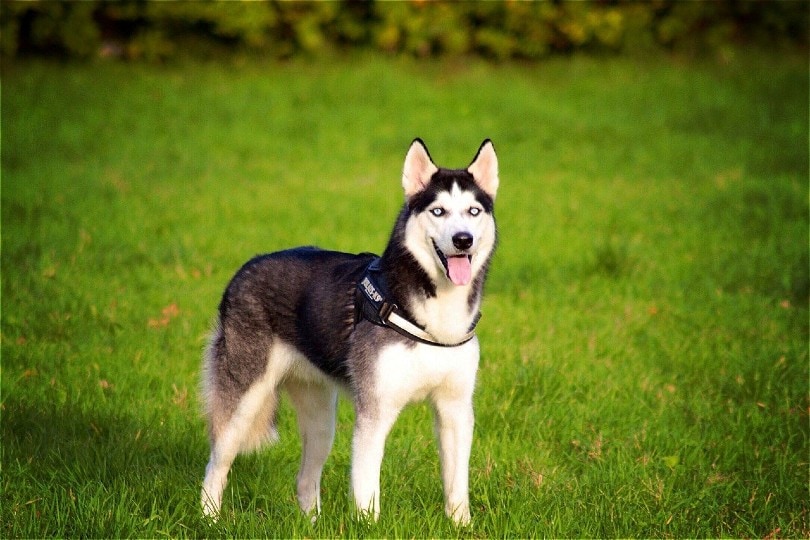How Long Do Huskies Live: Canine Lifespan Unveiled

Huskies typically live between 12 to 15 years. Their lifespan can be influenced by various factors.
Factors such as genetics, diet, exercise, and overall healthcare play a vital role in determining a Husky’s longevity. Providing them with a balanced diet, regular exercise, and proper veterinary care can help extend their lifespan. Understanding the needs of Huskies and addressing them accordingly can contribute to a healthy and fulfilling life for these beautiful and energetic dogs.
By being proactive in their care and well-being, you can ensure that your Husky enjoys a long and happy life as a beloved member of your family.
Introduction To Husky Lifespan
Huskies typically live between 12 to 15 years, but some can reach 18. Providing a healthy diet, regular exercise, and proper healthcare can help increase a husky’s lifespan. Regular vet check-ups and attention to their specific needs are essential for ensuring a long and happy life for your husky.
Huskies are known for their stunning appearance and captivating blue eyes, but have you ever wondered about their lifespan? Understanding the typical lifespan range of a husky is essential for anyone considering adding this breed to their family. In this article, we will explore the traits of a husky and provide insights into their average lifespan range.
Traits Of A Husky
Huskies are medium-sized working dogs with a strong build and a thick double coat that helps them thrive in cold climates. These energetic and intelligent canines are known for their friendly and playful nature. They have a strong sense of adventure and require regular exercise and mental stimulation to stay happy and healthy. Huskies are highly sociable animals and are often great companions for families.
Typical Lifespan Range
On average, huskies have a lifespan ranging from 12 to 15 years. However, it’s important to note that individual huskies may vary in terms of their longevity. Several factors can influence a husky’s lifespan, including genetics, diet, exercise, and overall healthcare. Providing a well-balanced diet, regular vet check-ups, and an active lifestyle can contribute to a longer and healthier life for your husky. To ensure your husky’s well-being, it’s crucial to be aware of common health issues that can affect this breed. Huskies are prone to certain conditions such as hip dysplasia, cataracts, and progressive retinal atrophy. Regular vet visits and early detection of any potential health concerns can help manage and treat these conditions effectively. Taking care of your husky’s physical and mental health is key to extending their lifespan. Regular exercise, such as daily walks or engaging in activities like hiking or running, can help keep your husky fit and mentally stimulated. Additionally, providing them with interactive toys and puzzles can keep their intelligent minds occupied and prevent boredom. In conclusion, understanding the lifespan of a husky is crucial for responsible pet ownership. By providing a loving home, proper nutrition, regular exercise, and routine veterinary care, you can help ensure that your husky enjoys a long and fulfilling life by your side. Remember, each husky is unique, so providing individualized care and attention is essential for their overall well-being.
Factors Influencing Husky Longevity
Husky longevity is influenced by various factors such as genetics, diet, exercise, and overall healthcare. Providing a balanced diet, regular exercise, and proper medical attention can help extend the lifespan of your husky.
Genetic Influences
Environmental Conditions
The Role Of Diet And Nutrition
Proper diet and nutrition play a crucial role in the overall health and lifespan of huskies. Providing your furry friend with a well-balanced and nutritious diet is essential for ensuring they live a long and healthy life. In this section, we will explore the key aspects of husky nutrition, including essential nutrients and common dietary concerns.
Essential Nutrients For Huskies
Huskies require a balanced diet that provides them with all the essential nutrients they need to thrive. Here are some key nutrients that should be included in their diet:
- Protein: High-quality protein sources such as chicken, fish, or lamb are important for huskies as they are active dogs with a lot of energy to burn.
- Fats: Healthy fats like omega-3 fatty acids help maintain a healthy coat and skin. Sources of good fats include fish oil and flaxseed.
- Carbohydrates: Huskies can benefit from complex carbohydrates found in whole grains like brown rice and oatmeal, providing them with sustained energy.
- Vitamins and Minerals: Essential vitamins and minerals, such as vitamin A, vitamin C, calcium, and iron, are necessary for the overall well-being of huskies.
Common Dietary Concerns
While providing a well-balanced diet is important, it is also crucial to be aware of common dietary concerns that can affect huskies:
- Food Allergies: Huskies may develop allergies to certain foods, such as grains or chicken. It is essential to monitor their diet and consult a veterinarian if any signs of allergies occur.
- Obesity: Huskies are prone to obesity if they consume more calories than they burn. Maintaining a healthy weight is vital to prevent joint problems and other health issues.
- Hydration: Keeping huskies hydrated is crucial, especially during hot weather or vigorous exercise. Make sure to provide fresh water at all times.
By understanding the importance of diet and nutrition, as well as being aware of common dietary concerns, you can ensure that your husky lives a long, healthy, and happy life. Remember to consult your veterinarian for personalized dietary recommendations based on your husky’s specific needs.
Exercise Needs For Huskies
Huskies are a breed renowned for their energy and athleticism. Understanding the exercise needs of these magnificent dogs is crucial in ensuring their health and well-being.
Physical Activity Recommendations
Huskies are high-energy dogs that require regular and vigorous exercise to stay healthy and happy. Daily physical activity is essential for meeting their needs. A combination of running, hiking, and playing are ideal for these active canines. Providing at least 30 to 60 minutes of exercise each day can help prevent behavioral issues that may arise from pent-up energy.
Effects Of Exercise On Health
Regular exercise has a significant impact on the overall health of huskies. Adequate physical activity can prevent obesity, improve cardiovascular health, and enhance muscle tone. Engaging in sufficient exercise also promotes mental stimulation, reducing the likelihood of destructive behaviors. Huskies that receive proper exercise are generally happier and have a lower risk of developing health issues.
Common Health Issues In Huskies
Huskies are prone to certain health issues, which can affect their lifespan. On average, Huskies live for 12-14 years, but factors such as genetics, diet, and exercise play a significant role in determining their longevity. It’s important to provide proper care and regular veterinary check-ups to ensure a healthy and long life for your Husky.
Huskies are generally healthy dogs, but like any other breed, they are prone to certain health issues. Being aware of these common health problems can help you take proactive measures to ensure the well-being of your furry friend. In this article, we will discuss two categories of health issues that Huskies commonly face: hereditary diseases and preventable illnesses.
Hereditary Diseases
Huskies, like many purebred dogs, may inherit certain genetic conditions that can affect their health. It is crucial for potential Husky owners to be aware of these hereditary diseases and take necessary precautions. Some common hereditary diseases in Huskies include:
- Progressive Retinal Atrophy (PRA): PRA is a degenerative eye disease that can lead to vision loss and eventually blindness. Regular eye examinations by a veterinarian can help detect PRA early on.
- Hip Dysplasia: This condition occurs when the hip joint doesn’t develop properly, leading to discomfort and mobility issues. Regular exercise, a balanced diet, and avoiding excessive weight gain can help reduce the risk of hip dysplasia.
- Idiopathic Epilepsy: Huskies are known to be prone to epilepsy, a neurological disorder that causes recurrent seizures. Medication can help manage the seizures, but it’s essential to consult a veterinarian for proper diagnosis and treatment.
- Hypothyroidism: This condition occurs when the thyroid gland doesn’t produce enough hormones, leading to various health problems. Regular blood tests can help detect and manage hypothyroidism in Huskies.
Preventable Illnesses
While hereditary diseases are beyond our control, there are several preventable illnesses that Huskies can be protected against. By maintaining a proper healthcare routine, you can significantly reduce the risk of these illnesses. Here are some preventable illnesses to watch out for:
- Parasitic Infections: Regularly deworming your Husky and providing flea and tick prevention can help protect them from parasitic infections.
- Obesity: Huskies are energetic dogs that require regular exercise and a balanced diet. Obesity can lead to various health issues, including joint problems and heart disease. Ensure your Husky maintains a healthy weight through proper nutrition and regular exercise.
- Heatstroke: Huskies have a thick double coat that makes them susceptible to heatstroke. Avoid exposing them to extreme heat and provide plenty of water and shade, especially during hot weather.
- Dental Problems: Huskies can develop dental issues such as gum disease and tooth decay. Regular teeth brushing and providing appropriate chew toys can help maintain their oral health.
By being aware of these common health issues, you can take proactive steps to ensure your Husky lives a long and healthy life. Remember, regular veterinary check-ups, a balanced diet, exercise, and lots of love and care are the keys to keeping your Husky in top shape.

Credit: www.dogster.com
Veterinary Care Through The Years
Routine Check-ups
Regular veterinary check-ups are essential for maintaining the health and well-being of your husky. Scheduling routine visits allows the veterinarian to monitor your husky’s overall health, administer necessary vaccinations, and address any emerging health concerns. Through these regular check-ups, potential issues can be identified early, contributing to a longer and healthier life for your husky.
Senior Husky Health Management
As your husky ages, their health care needs evolve. Senior huskies require specialized veterinary care to address age-related conditions such as arthritis, vision impairment, and dental issues. Monitoring their weight, joint mobility, and organ function becomes crucial in ensuring their comfort and quality of life. Regular screenings and geriatric assessments help in early detection of potential health issues, enabling appropriate intervention and management.
The Impact Of Spaying/neutering
Spaying/neutering has a positive impact on a husky’s lifespan, helping them live longer and healthier lives. This procedure reduces the risk of certain diseases and behavioral problems, contributing to an overall increase in their lifespan.
Health Benefits
Spaying/neutering huskies can reduce the risk of certain health issues.
Life Expectancy Correlation
Spaying/neutering has been linked to longer lifespans in huskies.
Spaying/neutering huskies can have significant effects on their health and longevity.
Health Benefits
- Reduces risk of cancer
- Prevents pyometra infections
- Controls overpopulation
Life Expectancy Correlation
- Spayed/neutered huskies live longer
- Decreased risk of fatal diseases
- Improved overall well-being
Owner’s Guide To Enhancing Husky Lifespan
As a responsible husky owner, you play a crucial role in enhancing your furry companion’s lifespan. By following these expert tips, you can ensure your husky enjoys a long and healthy life.
Daily Care Tips
- Provide high-quality dog food rich in protein and nutrients.
- Regular exercise to keep your husky physically fit.
- Grooming to maintain a healthy coat and skin.
- Regular vet check-ups to monitor your husky’s health.
Long-term Commitment Strategies
- Training sessions for mental stimulation and obedience.
- Socialization with other dogs and people.
- Provide a safe environment for your husky to thrive.
- Maintain a consistent routine for stability and well-being.
Real-life Husky Longevity Stories
Discover inspiring real-life husky longevity stories that showcase how long huskies can live. From heartwarming accounts of huskies reaching their late teens to remarkable tales of dogs surpassing the average lifespan, these stories offer a glimpse into the longevity potential of these beloved canine companions.
Record Age Achievers
One exceptional Husky lived to 25 years old.
Inspirational Husky Tales
A Husky rescued at 10 years old lived happily for another 12 years.

Credit: nativepet.com
Conclusion: Embracing Your Time With A Husky
Embrace the time you have with your Husky as they typically live for around 12-15 years. Make the most of their energetic nature and enjoy their company for as long as possible.
Quality Of Life Considerations
Ensure balanced diet, regular exercise, and veterinary check-ups for a healthy Husky.
Making Every Moment Count
Cherish playtime, walks, and bonding sessions with your loyal and affectionate Husky.

Credit: www.dogster.com
Frequently Asked Questions
How Long Do Huskies Live On Average?
Huskies have a lifespan of 12-15 years on average. However, this can vary depending on several factors such as genetics, diet, exercise, and overall health.
What Can I Do To Increase My Husky’s Lifespan?
To increase your Husky’s lifespan, ensure they have a healthy diet, get regular exercise, and take them to the vet for check-ups and vaccinations. Also, make sure they are protected from extreme weather conditions.
Do Huskies Have Any Health Issues That Can Affect Their Lifespan?
Huskies are generally healthy dogs, but they are prone to some health issues such as hip dysplasia, cataracts, and allergies. Regular vet check-ups and proper care can help prevent or manage these issues.
Can The Lifespan Of A Husky Be Affected By Their Environment?
Yes, the environment can affect the lifespan of a Husky. Extreme weather conditions, poor living conditions, and lack of exercise can all contribute to a shorter lifespan. Providing a healthy and safe environment can help increase their lifespan.
Conclusion
The lifespan of a Husky is influenced by several factors, including genetics, diet, and healthcare. While the average lifespan of a Husky is 12-15 years, some can live up to 20 years with proper care. It is essential to provide them with a healthy diet, regular exercise, and routine vet check-ups to ensure they live a long and healthy life.
Understanding the lifespan of your Husky can help you make informed decisions about their care and enjoy their companionship for many years.



